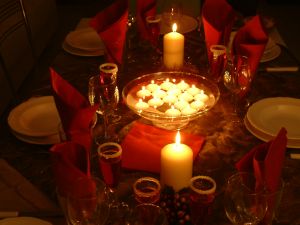Eat, drink and be merry!
 It is nearly impossible to find that sentiment in the media today. It’s all about eat, drink and be ... moderate, healthy, watch what you eat and stick to your diet. Humbug! In the Telegraph, Tom Hodgkinson asks ‘what’s stopping us from being merry’?
It is nearly impossible to find that sentiment in the media today. It’s all about eat, drink and be ... moderate, healthy, watch what you eat and stick to your diet. Humbug! In the Telegraph, Tom Hodgkinson asks ‘what’s stopping us from being merry’?What does ‘merry’ mean? It’s a word that, these days, is used only in conjunction with Christmas or to describe Robin Hood’s men. We have a vague notion that being merry is something to do with the red beaming face of Father Christmas and hearty laughter, but otherwise the idea of merriment seems an archaic irrelevance.
The word ‘merry’ actually captures an old-fashioned, fun-loving, medieval approach to life, and it’s a word and a concept that we might do well to resurrect in these grey bureaucratic days. The word reminds us that, in the Middle Ages, the light-hearted inhabitants of ‘Merry
In the old days,Christmas lasted a full 12 days, during which time you were not allowed to work. It was a whole 12 days given over to feasting and having fun. And the fun and indulgence were not indulged in guilty fashion, as is the case today.
The medieval merry-makers did not admonish themselves when the party was over and condemn themselves to self-torturing diets and new schemes for an improved life. On the contrary, to be merry was practically a social duty. Merriment was built into the ethical codes of the time. And the Church itself actually encouraged merriment, drinking and conviviality – not just at Christmas, but all year round.
Why was it so important to be merry for medieval England? According to Professor Ronald Hutton, of Bristol University, the big difference in the medieval approach to life was that they were intensely community-minded. ‘The medieval emphasis on community meant that there was a need to cultivate virtues that made communal life better,’ says Hutton. ‘Merriment, which we would today call conviviality, was one of these.’
And rather in the same way that Robin Hood’s outlawism was intimately bound up with his detached, devil-may-care attitude to life, the Christmas festival was a time when we could release our wild sides. The writer Jay Griffiths argues that the drunken Oxford Street reveller, clutching the lamppost, his reindeer antlers hanging on his head at a skewed angle, represents the real Christmas spirit: ‘The spirit of Christmas is not restrained or well-heeled, but excessive and vulgar in its original sense: of the common people.’
Christmas is therefore anti-authoritarian, and its real purpose is not so much to sit piously and remember the birth of Christ, but to dance and sing and drink ale and spiced wine to excess. The medieval spirit and the spirit of Christmas were about taking your pleasures now and damn the consequences. ‘Eat, drink and be merry, for tomorrow we may die,’ was the line from Ecclesiasticus that was used to give biblical approval to living in the moment....
The rest of his article is here.




<< Home